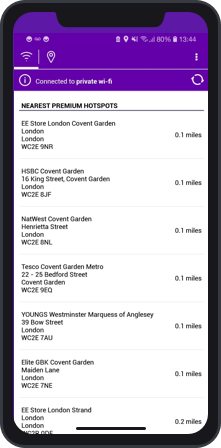Security
To help make sure you receive a safe and reliable service, BT encrypts your account details when you login to BT Wi-Fi.
To keep your data as secure as possible it's also important to keep your operating system security patches up to date. For example, you should regularly visit Microsoft's Windows update website or the software update section of Apple's website. And for extra security, we would recommend that you use strong firewall and anti-virus software and keep it regularly updated.
By their very nature, open public wi-fi networks operate without wireless encryption enabled in order for all users to be able to access them as a public service. This means while you're using open public networks, there's a potential risk information could be intercepted if an application or service (e.g. web site) doesn’t secure its own data in transit as it passes from the device (e.g. laptop, wi-fi enabled phone or tablet) to the open public wi-fi hotspot.
Because of this potential risk if you use public wi-fi hotspots to access email and other sensitive unencrypted information you're advised to implement an additional layer of security such as a VPN (Virtual Private Network).
VPNs work by encrypting all of your data to make it virtually impossible to intercept. Most large companies use VPN solutions to protect their data as it passes over public wi-fi networks.
Your device manufacturer can make a recommendation on the best VPN software or APP for Your device. Further information on internet security is available on www.getsafeonline.org
Tips to enhance your security
Install a personal firewall
Firewalls can help prevent unwanted users from accessing your device when you use wireless access to the internet. Some more sophisticated products will even alert you when an attempt is being made. By installing a personal firewall it reduces the ability of attackers to gain access to resources on your computer by allowing only traffic which is authorised by the intended user. Some operating systems include a personal firewall as standard, but it is important to check that the firewall is enabled. Free trial firewalls can be downloaded from the internet before you decide to purchase a full security firewall.
You can buy a firewall at BT Shop. BT Broadband Customers can download BT NetProtect anti-virus and firewall software free of charge.
Secure your personal details
Only input bank and other personal details when Secure Socket Layer (SSL) or HTTPS sessions are in progress (look for the padlock icon in your browser and click on it to confirm that the security certificate is valid).
Turn off file and print sharing
This will help prevent anyone from accessing your hard drive and looking at your files. To do this using Windows XP, go to your Control Panel, click on Network and Dial-Up Connections, find your wireless card, click on the Properties button, and uncheck the File and Print Sharing box to turn it off.
Keep your browser up to date
We recommend that you apply all patches and new versions of your browser software by regularly checking the browser vendor's home page for updates.
Check digital certificates are valid
If your browser software allows you to do so, please ensure that you select the option to display any out of date digital certificates that may be presented by the web sites you are browsing. This allows you to be confident that the web site is actually managed by the organisation or company that it claims to represent.




